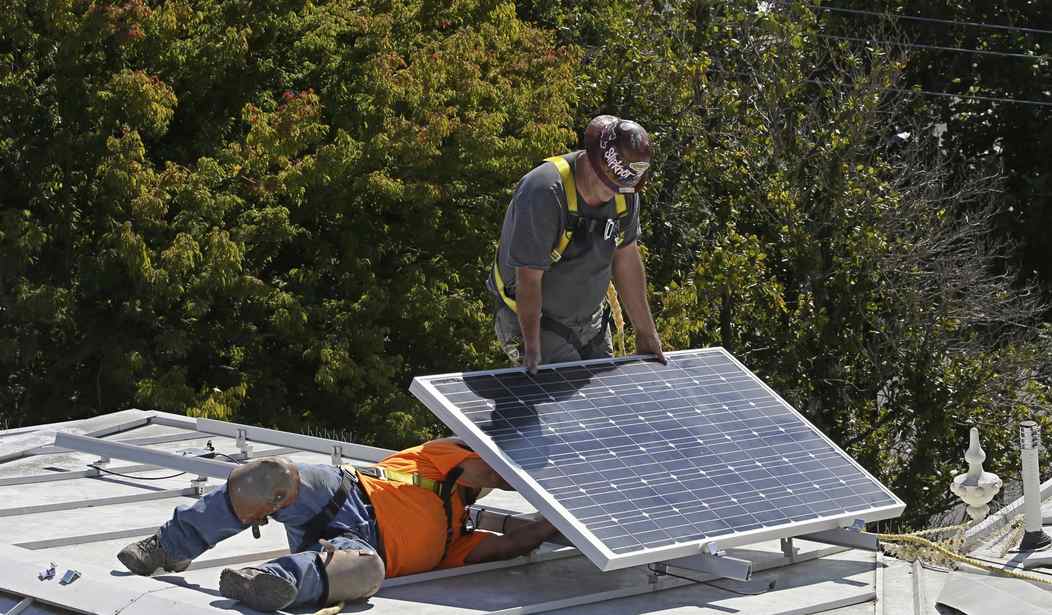About 2 1/2 years ago I wrote a post titled "California plans to kill the residential solar industry." At the time, I had just had solar panels installed on my roof to save money and within months California announced a new plan (Net Metering 3.0) that would have taxed me and anyone else who owned a rooftop solar system for owning the panels. I predicted that if this plan passed, California's rooftop solar industry would fall off a cliff.
The result of Net Metering 3.0 is likely going to be the end of the residential solar industry in California. I have a neighbor who was interested in possibly getting a system after I had mine installed. Like me, he figured that after 10 years he’d break even on the cost and would still get years of free power. But under the new system his break even point would be 18 years or more so now he doesn’t see the point. A lot of other people are going to run the numbers and reach the same conclusion. Solar installers are about to see their orders drop off a cliff which doesn’t make much sense if the goal was to shift people to green energy. Earlier this week, Elon Musk (who owns one of the major solar installers) called the new plan “insane.”
The backlash to the initial plan was strong enough that Net Metering 3.0 was revised but eventually it did pass and went into effect on April 15, 2023. Since then, rooftop solar installations in California have indeed fallen off a cliff. The NY Times wrote about it in January of this year.
California has long championed renewable energy, but a change in the state’s policies last year has led to a sharp decline in the installation of residential rooftop solar in the state.
Thousands of companies — including installers, manufacturers and distributors — are reeling from the new policy, which took effect in April and greatly reduced incentives that had encouraged homeowners to install solar panels. Since the change, sales of rooftop solar installations in California dropped as much as 85 percent in some months of 2023 from a year earlier, according to a report by Ohm Analytics, a research firm that tracks the solar marketplace. Industry groups project that installations in the state will drop more than 40 percent this year and continue to decline through 2028...
Construct Sun, a solar installation company that is based in Reno, Nev., stopped doing business in California after its sales dried up four months after the policy began; executives said the company was now focusing its efforts on Florida, North Carolina and Ohio...
The nation’s largest residential solar company, Sunrun, which is based in San Francisco, cut about 2,000 jobs after California regulators reduced the rooftop incentives.
There is a caveat here which I have to mention. Solar installation was up slightly in 2023 compared to 2022. Supporters of the new policy point to this as proof that the industry is fine. But the truth is that the vast majority of those installs happened in the first three months of 2023 before the policy went into effect. There was a rush of buyers trying to get in on the good rates but since then the entire industry is down sharply.
But that may not be the end of the story. On Wednesday, the California Supreme Court agreed to hear a case about Net Metering 3.0.
The court agreed on Wednesday to hear a challenge to a disastrous decision by the California public utilities commission, or CPUC, to decimate the state’s once-thriving rooftop solar program. The appeal was filed by the Center for Biological Diversity, or CBD, Environmental Working Group and the Protect Our Communities Foundation...
“The Supreme Court’s decision is a ray of hope for rooftop solar at a time when plummeting installations and massive layoffs are wrecking this vital industry and jeopardizing California’s climate goals,” said Roger Lin, a senior attorney at CBD.
We'll have to wait and see what happens but there's still a chance this decision could be reversed or dialed back. More recently, California Democrats have come up with an even worse plan which amounts to an income tax paid to your utility company.
Under the proposal, households will see a fixed rate covering basic electricity services and the utility company’s operating costs on a scale based on their household income.
- Households with annual income from $28,000 – $69,000 would pay $20 a month in Edison territory, $34 a month in SDG&E territory and $30 a month in PG&E territory.
- Households earning from $69,000 – $180,000 would pay $51 a month in Edison and PG&E territories and $73 a month in SDG&E territory.
- Those with incomes above $180,000 would pay $85 a month in Edison territory, $128 a month in SDG&E territory and $92 a month in PG&E territory.
In California Karl Marx is now apparently running the utilities. Those rates aren't based on usage, just on income and this new plan could take effect as soon as this summer. If it goes through I will be paying about $1,000 a year to Southern California Edison even though I literally generate more electricity than I use on an annual basis. It's stuff like this that makes people decide to pack up and leave the state of California for good.







Join the conversation as a VIP Member